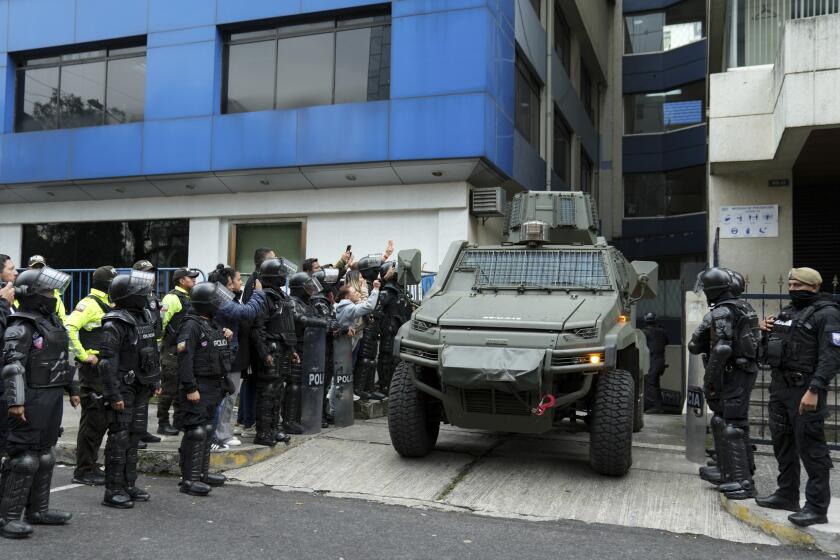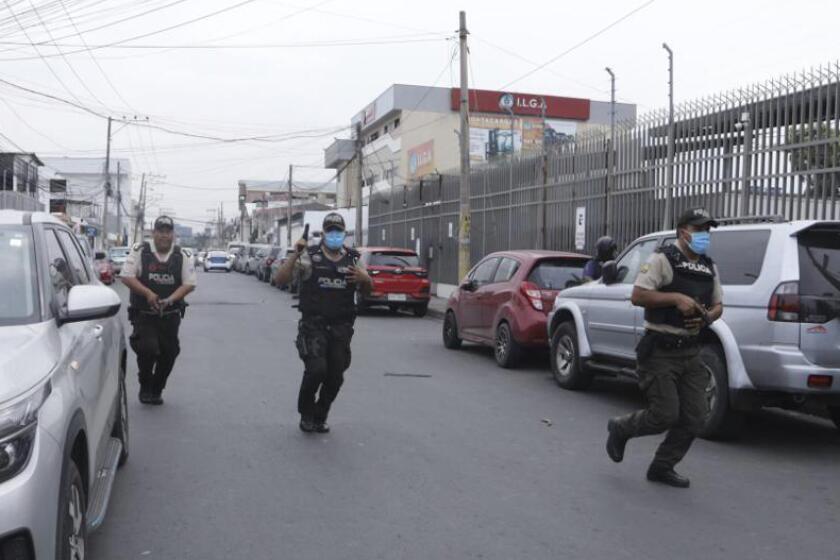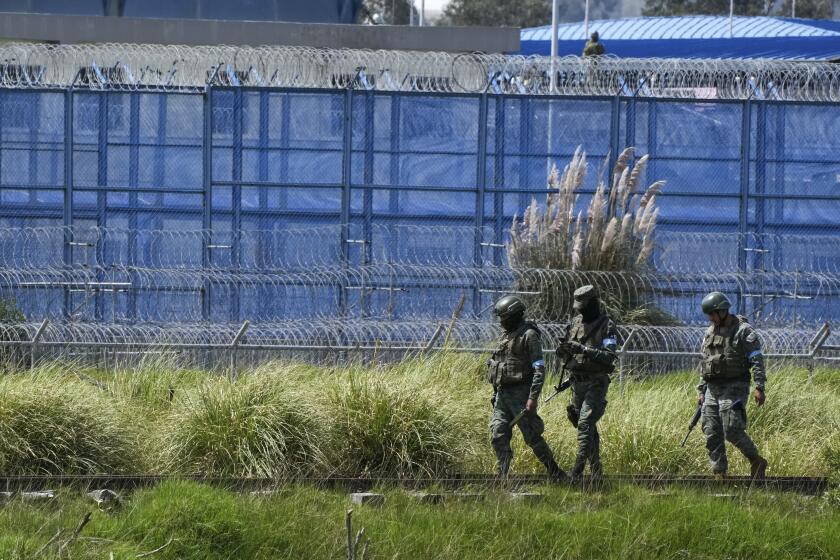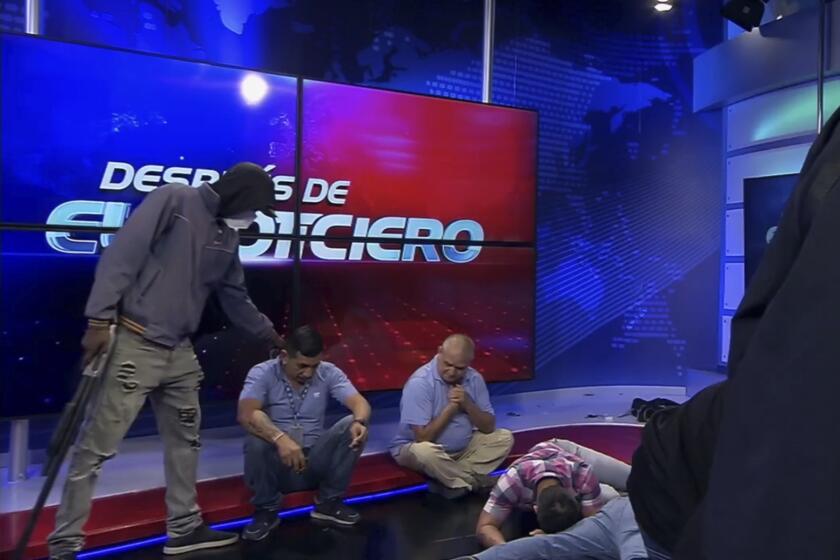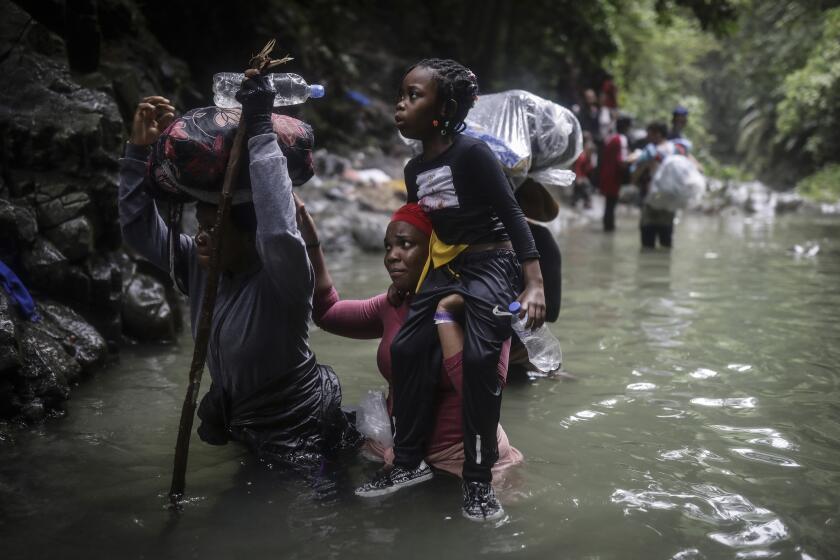Global leaders condemn Ecuador after police break into the Mexican Embassy
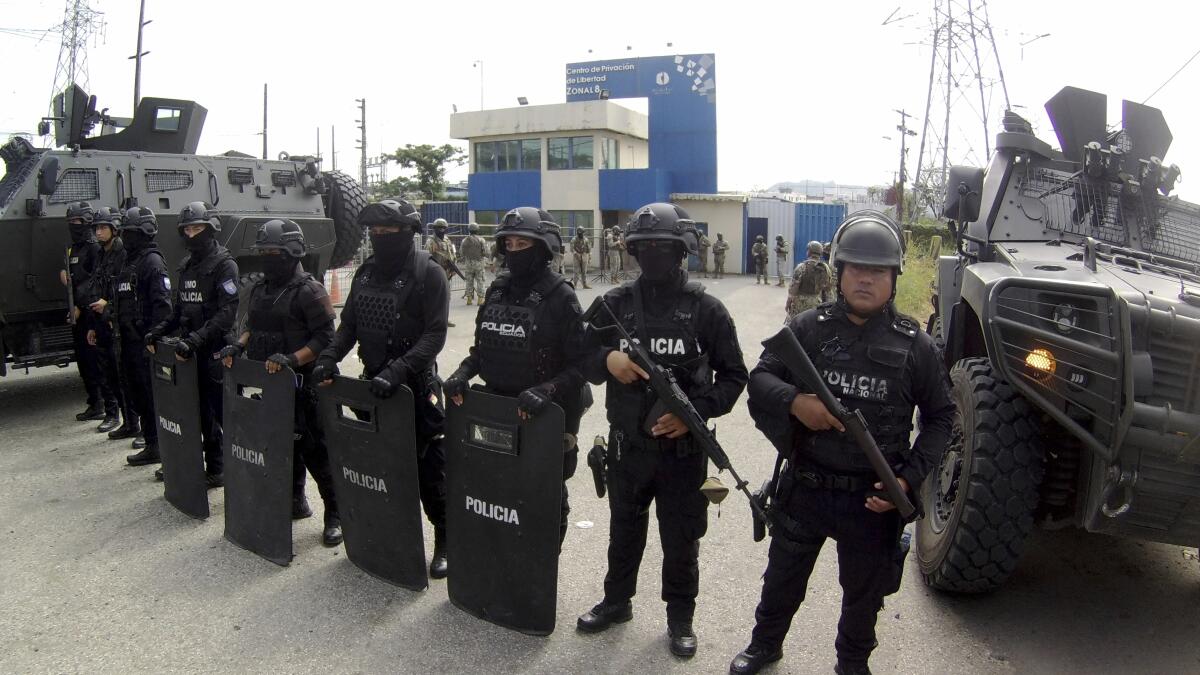
- Share via
QUITO, Ecuador — The global condemnation of Ecuador’s government for its decision to break into the Mexican Embassy snowballed Sunday, with more leaders expressing disapproval, shock and dismay.
The criticism came as Mexico’s ambassador and other personnel arrived Sunday afternoon in Mexico City after departing Ecuador’s capital, Quito, on a commercial flight. President Andrés Manuel López Obrador severed diplomatic ties with Ecuador immediately after Friday’s raid, which international law experts, presidents and diplomats have deemed a violation of long-established international accords.
Alicia Bárcena, Mexico’s secretary of foreign relations, thanked the returning diplomats Sunday afternoon “for defending our embassy in Quito even at the risk of their own physical well-being.”
“Not even the dictator Pinochet had dared to enter the Mexican embassy in Chile. They entered violently and without authorization, physically assaulting [diplomats],” she said at a press conference. “We energetically condemn it.”
A former Ecuadorean vice president is arrested after a raid at the Mexican Embassy in the South American country. Mexico breaks off diplomatic relations.
Police broke through the external doors of the Mexican Embassy in Quito to arrest Jorge Glas, a former Ecuadorian vice president who had been residing there since December. He had sought asylum after being indicted on corruption charges.
Bárcena said Mexico plans to challenge the raid Monday at the World Court in The Hague. She added that 18 countries in Latin America, 20 in Europe and the Organization of American States have backed Mexico on the issue.
“The entry by force into the Embassy of Mexico in Quito constitutes a violation of the 1961 Vienna Convention on Diplomatic Relations,” Spain’s Ministry of Foreign Affairs said in a statement Sunday. “We call for respect for international law and harmony between Mexico and Ecuador, brotherly countries to Spain and members of the Ibero-American community.”
A day earlier, the OAS reminded members, which include Ecuador and Mexico, of their obligation not to “invoke norms of domestic law to justify non-compliance with their international obligations.”
Masked men broke onto the set of a public television channel in Ecuador, waving guns and explosives, during a live broadcast.
U.S. State Department spokesperson Matthew Miller said the nation “condemns any violation of the Vienna Convention on Diplomatic Relations, and takes very seriously the obligation of host countries under international law to respect the inviolability of diplomatic missions.” He called on Ecuador and Mexico to resolve their differences.
Honduran President Xiomara Castro, writing on X, characterized the raid as “an intolerable act for the international community” and a “violation of the sovereignty of the Mexican State and international law” because “it ignores the historical and fundamental right to asylum.”
Diplomatic premises are considered foreign soil and “inviolable” under the Vienna treaties, and law enforcement agencies in host countries are not allowed to enter without the permission of the ambassador. People seeking asylum have lived at embassies around the world for days or even years. Ecuador’s embassy in London housed WikiLeaks founder Julian Assange for seven years, as British police could not enter to arrest him.
Bárcena, Mexico’s secretary of foreign relations, on Friday posted to X that a number of diplomats suffered injuries during the break-in.
A prosecutor in Ecuador who was investigating an attack on the set of a public television channel by a group of armed men last week has been slain.
On Saturday, Glas was taken from the attorney general’s office in Quito to the port city of Guayaquil, where he will remain in custody at a maximum-security prison.
His attorney Sonia Vera told the Associated Press that officers broke into his room in the Mexican embassy, and he resisted when they attempted to put his hands behind his back. She said the officers then “knocked him to the floor, kicked him in the head, in the spine, in the legs, the hands,” and when he “couldn’t walk, they dragged him out.”
Vera said the defense team was not allowed to speak with Glas while he was at the prosecutor’s office and is working to file a habeas corpus petition to challenge the charges against him.
Authorities are investigating Glas over alleged irregularities during his management of reconstruction efforts following an earthquake in 2016 that killed hundreds of people. He was convicted on bribery and corruption charges in other cases.
Ecuador’s Foreign Minister Gabriela Sommerfeld on Saturday told reporters that the decision to enter the embassy was made by President Daniel Noboa after considering Glas’ “imminent flight risk” and exhausting all possibilities for diplomatic dialogue with Mexico.
Authorities have arrested 13 people in connection with the storming of a television studio in Ecuador, which is dealing with a huge spike in violence.
Mexico granted asylum to Glas hours before the raid. Sommerfeld said “it is not legal to grant asylum to people convicted of common crimes and by competent courts.”
Noboa became Ecuador’s president last year as the nation battled unprecedented crime tied to drug trafficking. In January, he declared the country to be in an “internal armed conflict” and designated 20 drug-trafficking gangs as terrorist groups that the military had authorization to “neutralize” within the bounds of international humanitarian law.
Will Freeman, a fellow of Latin American studies at the Council on Foreign Relations, said the decision to send police to Mexico’s embassy raises concerns over the steps Noboa is willing to take to get reelected. His tenure ends in 2025, as he was elected only to finish the term of former President Guillermo Lasso.
“I really hope Noboa is not turning more in a Bukele direction,” Freeman said, referring to El Salvador President Nayib Bukele, whose tough-on-crime policies have been heavily criticized by human rights organizations. “That’s to say, less respectful of rule of law in order to get a boost to his popularity ahead of the elections.”
Freeman added that whether Glas was abusing diplomatic protection is a “separate issue” from the decision to send police to the embassy.
Human Rights Watch says migrants who cross the Darien Gap on their way to the U.S. have become increasingly exposed to robberies and sexual violence.
“We see a pattern of that in Latin America, with politicians abusing embassies and foreign jurisdictions, not to flee prosecution but to flee accountability,” he said.
The Mexican Embassy in Quito remained under heavy police guard after the raid.
Vera, Glas’ attorney, said she fears “something could happen” to him while in custody, considering the track record of Ecuador’s detention facilities, where hundreds have died during riots over the past few years. Those killed while in custody include suspects in last year’s assassination of a presidential candidate.
“In Ecuador, going to jail is practically a death sentence,” Vera said. “We consider that the international political and legal person responsible for the life of Jorge Glas is President Daniel Noboa Azín.”
Cano and Molina write for the Associated Press. Cano reported from Mexico City. AP writers Megan Janetsky in Mexico City and Gonzalo Solano in Quito contributed to this report.
More to Read
Sign up for Essential California
The most important California stories and recommendations in your inbox every morning.
You may occasionally receive promotional content from the Los Angeles Times.
